Monographs
Forthcoming
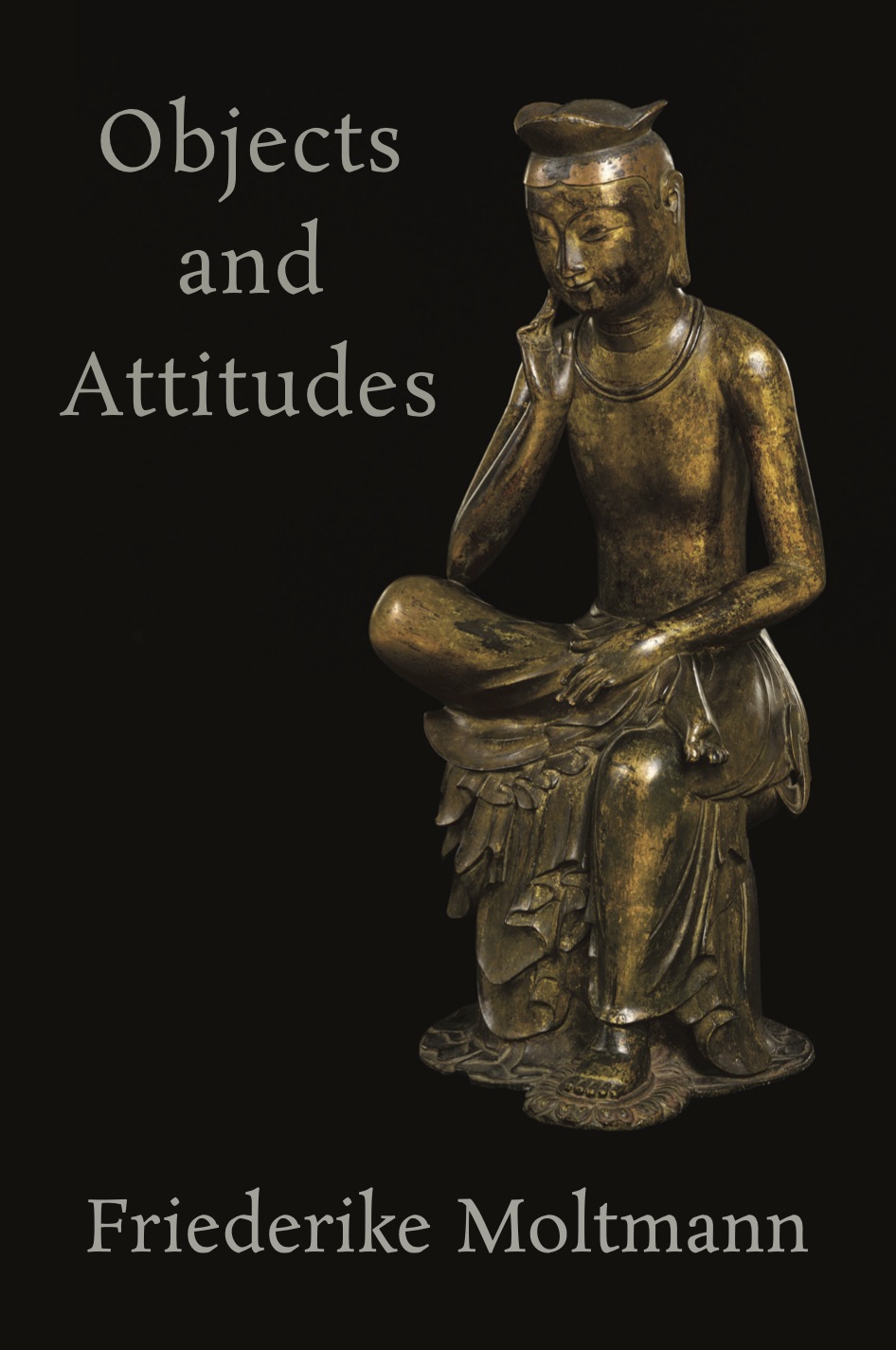
Abstract: This book pursues an approach to sentence meaning on which sentences (independent and embedded) semantically act as predicates of various attitudinal and modal objects, entities like claims, requests, promises, obligations, and permissions, rather than standing for abstract propositions playing the role of objects. The approach, which also makes use of truthmaker semantics, has a wide range of applications to issues in philosophy of language, semantics, and philosophy of mind.
Prepublication version (please cite published version!)
Table of Contents (September 23)
Sources and Acknowledgments (September 2023)
Preface (version September 23)
Chapter 1: A New Approach to the Semantics of Attitude Reports and Modal Sentences (version August 23)
Chapter 2: The Ontology of Attitudinal and Modal Objects (version September 23)
Chapter 3: Object-Based Truthmaker Semantics, Norms of Truth and Direction of Fit (version September 23)
Chapter 4: Object-Based Truthmaker Semantics for Modals (verson September 23)
Chapter 5: The Syntax and Semantics of Basic Attitude Reports (version September 23)
Chapter 6: Levels of Linguistic Acts and the Semantics of Saying and Quoting (version September 23)
Chapter 7: Clauses in Functions other than as Predicates of Attitudinal or Modal Objects (version September 23)
Chapter 8: Conclusions and Avenues for Further Developments (version September 23)
References (version September 23)
Endorsements
“Friederike Moltmann’s Objects and Attitudes is a highly original work, presenting the results of over a decade of research at the intersection of linguistics and philosophy. It represents an important contribution to contemporary work on content and the ongoing hyperintensional revolution in semantics. Moltmann develops Kit Fine’s truthmaker semanticsim in novel ways to provide fine-grained notions of content for satisfiables, like beliefs and desires. It is a challenging and highly rewarding read.”—Mark Jago, University of Nottingham
“This book purses a bold idea: that both root and embedded sentences are not what we thought. Instead of, say, abstract propositions, it argues that sentences are predicates of things—objects like claims and obligations. The implications for semantics and natural language ontology are clear. Friederike Moltmann is one of very few scholars who can engage with the philosophy of language and generative syntax in one breath.”—Keir Moulton, University of Toronto
“For all their familiarity, things like claims, needs, conjectures, and possibilities—'satisfiables,’ Friederike Moltmann calls them—have not been accorded much theoretical respect. That changes now. Moltmann builds a semantics around them but with a crucial twist: Satisfiables have satisfiers, which puts the whole apparatus of truthmaker semantics at her disposal. Once froth on the waves, they become in Moltmann the wavemakers.”--Stephen Yablo, Massachusetts Institute of Technology
This book argues in favor of Plural Reference (reference to several things at once) for the semantics of natural language and explores the connection between Plural Reference and Alternative Semantics for the purpose of the semantics of to three-dimensional syntactic structures of coordination, in the sense of Goodal, Muadz, and myself in my 1992 Ph D thesis.
Appeared:
Online version
The common view in philosophy and linguistic semantics is that natural language involves a great range of expressions that make reference to abstract objects, such as properties, propositions, degrees, numbers, and expression types. This book argues that this view is mistaken: the ontology of natural language at its core is particularist, involving instead reference to various sorts of tropes (particularized properties) or trope-related entities, to pluralities (as many) of particulars, as well as variable objects (which strictly inherit their properties from their manifestations), in addition to expressions apparently standing for abstract objects playing in fact a nonreferential role. Only in the 'periphery' of language, with 'reifying terms' such as the proposition that S, the fact that S, the property of being an N, the number eight, the word eight, and the truth value true, is reference to abstract objects possible.
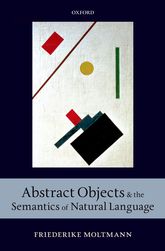
"In Moltmann's work, linguistic, metaphysical and more general philosophical insight and theory are expertly woven together in an exceptionally original and rewarding way. This book is essential reading for philosophers, linguists and cognitive scientists." - Mark Sainsbury, University of Texas at Austin
"This book is important for its hypotheses and conclusions, but even more so for its methodology: Moltmann's thorough and careful examination of linguistic (and crosslinguistic) data has raised so-called descriptive metaphysics, the analysis of the categories of being implicitly recognized by ordinary language and commonsense thought, to a new level." - John P Burgess, Princeton University
"The book is highly recommended to philosophers and linguists alike. Those interested in semantics, ontology, or descriptive metaphysics would benefit greatly from studying it." - Byeong-uk Yi, Mind
OUP blog entry
'Abstract objects: two ways of introducing them, in the core and the periphery of language' (June 2017)
Reviews
Payne, J. : 'Book Note. Friederike Moltmann: Abstract Objects and the Semantics of Natural Language.' Australasian Journal of Philosophy 92.1. link
Yi, B.-Y: Book Review Friederike Moltmann 'Abstract Objects and the Semantics of Natural Language', Mind (2015) 124 (495): 958-964.
Online version
This book establishes a great range of empirical generalizations about plurals, mass nouns and various part-related exprssions such as whole, individual(ly), completely, and binary distributive quantifiers such as one at a time and piece by piece. It develps a theory of situated part structures in which the notion of an integrated whole plays a central role. The book argues that this notion is what is at stake in the semantics of part-related expressions as well as part-structure-related semantic selectional requirements, rather than the extensional mereological relation. The latter, it is argued, is not only inadequate for the relevant range of natural language phenomena, but also involves serious conceptual flaws when applied to natural language semantics.
Table of Content
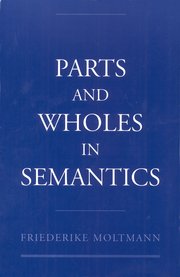
"Moltmann's book contains a more varied range of linguistic data than most other formal semantic works about plurality and it offers an original way of approaching these data."--Notes on Linguistics
"This book is a very interesting one. It presents new and promising views of the count/plural/mass distinction, supporting them through extensive discussions of many phenomena. The basic idea - in singling out special entities which play a major role in accounting for count- and plural-like behaviour, according to contextually controllable integrity conditions - is challenging and with far-reaching consequences. Moreover, the breadth of coverage, and the attempts at discussing crosslinguistic and comparative evidence are worth particular notice." --Fabio Pianesi, Linguistics and Philosophy
OUP blog entry
'Unity without objecthood, in art and in natural language' (July 2017)
Reviews
Zwarts, J. 'Review of 'Parts and Wholes in Semantics' by Friederike Moltmann''. Notes on Linguistics 3(1), 2000, pp. 117-18.
Pianesi F. 'Review of Friederike Moltmann: 'Parts and Wholes in Semantics''. Linguistics and Philosophy 25(1), 2002, pp. 97-124.
-
Coordination and Comparatives, Ph D dissertation, Massachusetts Institute of Technology, 1992. MIT Working Papers in Linguistics (MITWPL), MIT, Cambridge (Mass).
Online version
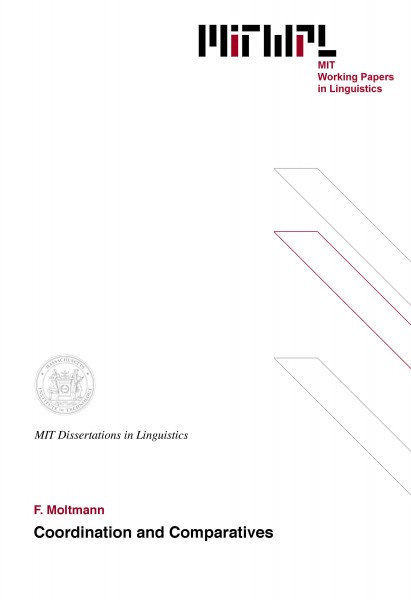
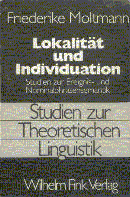
This book develops various analyses regarding the semantics of events and noun phrases within a view of semantic composition that is based on syntactic functions and roles, rather than just constituent structure and the meanings of individual expressions (as in Montague Grammar). The view is due to the important German theoretical linguist Hans-Heinrich Lieb. I still consider it the best, most adequate conception of compositionality, including for the purpose of doing compositional semantics for generative syntax. The view, for example, allows the same expression to have different semantically relevant syntactic roles in different contexts and multiple roles at once, and it makes a clear distinction between syncategorematic (contributions of) expressions and categorematic ones (unlike Montague Grammar). The view can also be considered a precurseur of Kit Fine's (2007) Semantic Relationalism. I make use of that view in other subsequent work of mine, for example in my 1992 paper on reciprocals and 'same/different' and in my 1992 MIT PhD thesis on coordination within three-dimensional syntax.
The book also anticipates the approach to the semantics of plurals and mass-count based on the notion of an integrated whole in my book Parts and Wholes in Semantics (OUP, 1997) and a range of related papers.
Online copy:
(Part 1) (Part 2) (Part 3) (Part 4) (Appendix and Bibliography)
Edited volumes
This volume brings together recent papers on the logic and semantics of pluralities by leading researchers. Most of them focus on the debate whether pluralities are 'one' or 'many' and whether definite plurals such as the eight students stand for single collective entities (sums, sets) or rather refer plurally to several things at once.
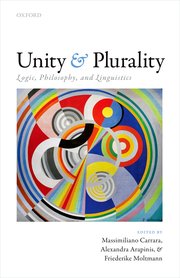
OUP blog entry
'The one, the many and the neither one nor many: On Hokusai's woodblockprints' (November 2016)
Reviews
A. Mari: Notre Dame Philosophical Reviews, January 2017
E. Snyder: The Bulletin of Symbolic Logic, 22(4), 2016, 530-532. doi:10.1017/bsl.2016.38
L. Azzano: Dialectica, Vol. 72, N° 2 (2018), pp. 309 pdf
G. Lando: Studia Logica, 2018, online first
R. Baratella: Philosophical Quarterly, to appear. pdf
This volume brings together historical and contemporary research that pursues an act-based or cognitive approach to propositional content.
Table of Contents
Introduction by Friederike Moltmann and Mark Textor
.jpg)
'This important collection gives Anglophone contemporary philosophers of mind and language access for the first time to historical and current writing defending the view that the notion of an act, rather than a propositional content, is fundamental in explaining propositional attitudes and their linguistic expression. Collectively the essays provide a substantial philosophical and linguistic challenge to unexamined doctrines that we have inherited. The volume deserves and will repay detailed attention.' - Chris Peacocke, Columbia University and the Institute of Philosophy, London University
OUP blog entry:
'What sorts of things are the things we believe, hope, or predict?' (July 30, 2017)
Reviews
Sebastién Richard. Grazer Philososophie Studien 94.4., 2019, 639-645. link
Table of Contents
Introduction
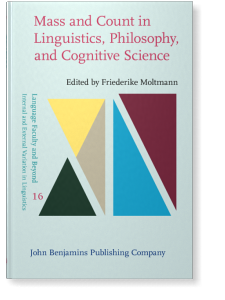
Reviews
Laure Gardelle, online access, Review de Linguistique de de Didactique des Langues 65, 2022.